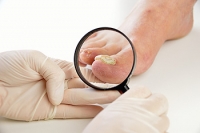Dallas Podiatrist for Toenail Fungus
Contents
Toenail fungus can make you self-conscious about your feet. But North Dallas Podiatrist can help resolve stubborn toenail fungus. She provides prescription medication to destroy the infection, as well as simple in-office procedures. Prompt treatment can keep the fungus from spreading and clear up discolored nails. Call our team to schedule an appointment, or book online today.
 Toenail fungus is a contagious infection. It often begins as a small spot under the tip of your nail. But over time, the infection spreads deeper into the nail. Your toenail may become thick or discolored, and it may crack along the edge.
Toenail fungus is a contagious infection. It often begins as a small spot under the tip of your nail. But over time, the infection spreads deeper into the nail. Your toenail may become thick or discolored, and it may crack along the edge.
Without treatment, toenail fungus spreads quickly. You may develop symptoms on several nails or both feet.
What Causes Toenail Fungus?
Toenail fungus is caused by fungal organisms in the toenails. These fungi grow best in warm, damp environments – such as sweat-soaked shoes or swimming pools. Poor hygiene and an unhealthy immune system can also make you more vulnerable to fungal infections.
What Are the Symptoms of Toenail Fungus?
Symptoms of toenail fungus vary depending on the severity of the infection. Common signs include yellow discoloration, brittle or thickened nails, foul odor, and separation from the nail bed. Pain and inflammation may also develop if the infection spreads to the surrounding skin.
How does toenail fungus spread?
Fungus likes warm, moist settings. You might pick up the infection by walking barefoot around a communal shower, swimming pool, or locker room. Fungal infections often enter your body through a small break in the skin or nails. Once you have a fungal infection, it can spread rapidly.
Wearing socks and shoes all day can worsen the problem. Because fungus thrives in warmth and darkness, socks and shoes provide the perfect environment. That’s why toenail fungus often spreads from one nail to another.
How is toenail fungus treated?
Most cases of toenail fungus respond to antifungal medication. If you have a fungal infection, North Dallas Podiatrist may prescribe oral or topical medication. It can take some time for these drugs to take effect.
Medication usually stops the infection, but it doesn’t change the appearance of the nail right away. Your nail may still look thick or discolored. Your toenails grow slowly, so it might take a year or more for the nail to clear up.
If your infection doesn’t respond to medication, you may need laser treatment. Laser treatment can destroy the infection and remove the damaged nail.
How Can I Prevent Toenail Fungus?
The best way to prevent toenail fungus is to practice good foot hygiene. Keep your feet dry and clean, wear breathable shoes, and don’t go barefoot in public places like gym showers or swimming pools. If you’re prone to fungal infections, try using topical antifungal creams and powders regularly.
When should I see a podiatrist for toenail fungus?
Many people ignore the warning signs of toenail fungus, but fungal infections aren’t just a cosmetic problem. An infected toenail often separates from the nail bed. Your nail may eventually loosen or fall off. Losing a toenail due to fungus can be painful.
At the office of North Dallas Podiatrist, you receive the care you need to get rid of the infection. We help you explore your options and clear up toenail fungus. She also explains how to keep from spreading the infection to others.
Are you frustrated by unsightly toenail fungus? Let us provide expert care. Call North Dallas Podiatrist and her team to schedule an appointment, or book online today.
